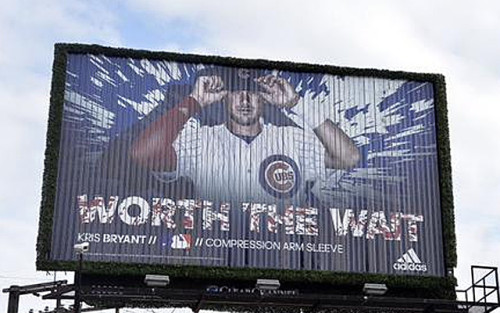 Baseball is back, and with it, a plethora of scintillating story lines. The Atlanta Braves are on pace to go 162-0. The Colorado Rockies have hit more doubles than God. Hanley Ramirez is on pace to hit 324 home runs. The Cubs are still terrible.
Baseball is back, and with it, a plethora of scintillating story lines. The Atlanta Braves are on pace to go 162-0. The Colorado Rockies have hit more doubles than God. Hanley Ramirez is on pace to hit 324 home runs. The Cubs are still terrible.
It’s a bit early to draw any meaningful data from the opening games of the season. For that reason, we’ll give it a few weeks before we really break down what’s going on in baseball. With that being said, there’s a few topics that have crossed my radar that I feel are both a) related, and b) speak a lot to the current nature of baseball.
Drama on the North Side
By now, everyone’s heard of Kris Bryant, the phenom 3rd baseman prospect for the Cubs. If you haven’t…he’s a phenom 3rd baseman prospect for the Cubs. Last year, he was the Minor League Player of the Year after he swatted something in the vicinity of 4,000 home runs. During spring training this year, he led all players in home runs with a whopping 9 while hitting over .400 in just 40 at bats. The dude is legit.
So, naturally, the Cubs sent him back to the minors for seasoning.
 On the surface, this doesn’t seem so shady. Bryant is hands down the best prospective player in baseball, with a ceiling that’s been quoted as somewhere in the vicinity of Eddie Mathews. If he comes along at the right time, he could become the face of the Cubs franchise for years to come. Speculating on prospects is all well and good, but the truth is that baseball is a hard game. Phenoms flame out all the time. Promote Bryant too soon, and it could hurt his destiny as a staple of the line-up.
On the surface, this doesn’t seem so shady. Bryant is hands down the best prospective player in baseball, with a ceiling that’s been quoted as somewhere in the vicinity of Eddie Mathews. If he comes along at the right time, he could become the face of the Cubs franchise for years to come. Speculating on prospects is all well and good, but the truth is that baseball is a hard game. Phenoms flame out all the time. Promote Bryant too soon, and it could hurt his destiny as a staple of the line-up.
The flip side is, well, the dude is really damn good. So why demote him?
The answer, as is the usual case in professional sports, is money, money, money.
When baseball players are promoted to the Major Leagues, they begin to accumulate service time. One year of service time is equivalent to 172 days spent on a major league roster. The club controls player wages for the first three years of their career. After three years have been accumulated, a player becomes eligible for salary arbitration – collective bargaining for their earnings. After three years of negotiations through arbitration, a player is free to sign with any team he wants (“free agency”). At that point, much of the control over what a player can earn transfers away from the club to the player.
As with any good American business, baseball has several loopholes in place to take advantage of this feature. One of them is that if a player isn’t on a major league roster isn’t promoted to the big leagues until after the first 12 days of a major league season, their full year of service time doesn’t come due until after their second season has already begun. Because of this, the player is designated a “Super Two”, and entitles them to an extra year of salary arbitration. The key here is that the player is put under an additional year of club control. Instead of the usual six years to free agency, that player now must wait seven years to have full control over what they earn.
This has drawn about many opinions. Cubs president Theo Epstein, naturally, is facing huge pressure to make sure that his roster is fully stocked for years to come – but also to make sure that it’s cost-effective. (Everyone remembers the woes that followed the 2007-2008 runs, when the bloated contracts of Alfonso Soriano and Carlos Zambrano started to come due.) Bryant, naturally, wants to be able to have a say in what he is played, where he can work for his living, and when he has a right to decide both of those options. Elsewhere, opinions are mixed. Cubs fans are torn between wanting him now (seriously, the dude can rake) and wanting him for as long as possible. Both his agent, the ever lovable Scott Boras, and the Players’ Union feel that this is a slight against baseball and an insult to players everywhere. Adidas is reveling in their ability to troll the construction wasteland that is Wrigley Field.
Oh, and then there’s breaking the Curse of the Billy Goat that has tormented this team for years.
The real ethical heart of the matter lies somewhere in a very muddled middle. Without getting into personal politics, Bryant probably should be playing in the majors right now. He’s proven that he at least deserves a shot. The Cubs are right in making sure that they’re able to hold onto Bryant for as long and as cheaply as possible before his salary starts to exceed the cost of the god damn video board that the team is leaving on at night and keeping me awake until the wee hours of the morning. And let’s face it – if you think that Bryant isn’t going to get paid and/or locked up to a giant mega-contract that lasts for at least the next seven years, well then I have this bridge in Brooklyn that I’d be happy to sell you.
What’s really interesting though is what this will mean in two years time, when baseball’s current CBA is set to expire. The Players’ Union is already on record as hating what this policy has turned into. Owners aren’t going to budge much when it comes to changing how they do business. The sport of baseball, a sport which has endured labor peace since 2003 with no lockouts, strikes, or strife (a streak that’s longer than any other professional American sports league, by the way), might very well come to blows if this issue becomes a major stumbling point in negotiations.
Oh, and if Bryant isn’t on the Cubs by the end of the month, I will eat my hat.
Heavenly Fall from Grace
 And now, a brief note about Josh Hamilton, the erstwhile left fielder for the Anaheim Angels, and the subject of my very first Recorder piece. A noted former addict, Hamilton has been largely clean since his return to baseball in 2007 (with two alcohol-related relapses on his record). Over the off-season, he relapsed on cocaine, but reported it immediately to Major League Baseball. After a round of arbitration to determine whether Hamilton had violated MLB’s drug policy, he was cleared of wrong-doing. As Hamilton’s currently rehabbing an injured shoulder, that should’ve been the end of it.
And now, a brief note about Josh Hamilton, the erstwhile left fielder for the Anaheim Angels, and the subject of my very first Recorder piece. A noted former addict, Hamilton has been largely clean since his return to baseball in 2007 (with two alcohol-related relapses on his record). Over the off-season, he relapsed on cocaine, but reported it immediately to Major League Baseball. After a round of arbitration to determine whether Hamilton had violated MLB’s drug policy, he was cleared of wrong-doing. As Hamilton’s currently rehabbing an injured shoulder, that should’ve been the end of it.
And then Angels general manager Jerry Dipoto fired off this salvo:
“The Angels have serious concerns about Josh’s conduct, health and behavior and we are disappointed that he has broken an important commitment which he made to himself, his family, his teammates and our fans.”
In addition, Angels president John Carpino is on record as stating that “…it defies logic that Josh’s reported behavior is not a violation of his drug program.”
I’m going to venture away from political correctness and state that this is absolutely disgusting. Hamilton has been a beacon of positivity to baseball ever since he returned. He’s a man of faith and good morals, beloved by teammates and by fans alike. He’s been sober since he returned to the sport he loves from a spiral into drug abuse that nearly killed him. In all of that time, he’s had three bad days. Hamilton probably gets tested more than any other player for every drug under the sun. It’s been theorized (probably rightly so) that without the structure that a baseball season provides for him, his chances of relapse are much higher. (It’s worth noting that all three of his recorded instances of relapse have occurred in the offseason.
To my mind, the statements by the Angels boil down to a team disappointed that they cannot recoup some of the money they promised to Hamilton when they signed him to a 5-year $125 million contract years ago. (As to whether it was wise to sign him for that much money with his injury history and battered body…well, Hamilton didn’t exactly hold a gun to their heads when he signed the deal.)
By throwing their once-favored son under the bus, the Angels are showing a shocking lack of class and dignity. They’re effectively shaming Hamilton for his relapse – and victim shaming is one of the major problems that all of America has when dealing with drug addiction. Instead of shunning Josh and trying to push him away, they should be embracing every method to help keep him on the right path.
Not because it’s the right business move. But because it’s the right thing to do.





